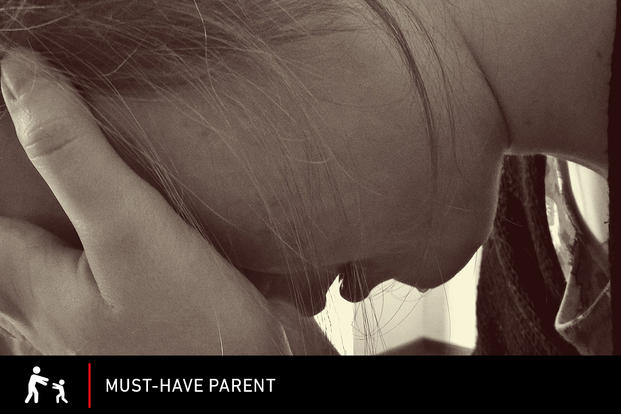I love "The Honest Toddler's" Bunmi Laditan. I mean, I don't know her, but I adore her writing. If you aren't familiar with her, click on that link, go read a few posts and then come back.
Great. You're back. You love her, too, right?
I was reading more Bunmi brilliance the other day and trying to put a finger on what it is that makes her so great. She's hilarious, obviously, but there's something more. She's raw, vulnerable and honest and doesn't appear to be worried about getting sniped by her readers.
I used to write like that. I miss writing like that.
As Must Have Parents we often find ourselves going through this journey alone. Worse, we're alone with kids. That means that finding other adults to commiserate with is even harder because we have to try to have adult conversation at the same time we're breaking up fights, breastfeeding and pouring goldfish crackers into travel cups. Being able to share our thoughts virtually is, in my opinion, one of the most valuable resources for solo parents. That's why I started blogging, to reach out and connect with other people who were experiencing the same things as me.
But each day I become more convinced that open, honest writing is an endangered resource. Raw, vulnerable writers, and those are the best kind, by the way, don't last long in this space. They churn out brilliance for about two years, and then they disappear.
I started writing a newspaper column way back in 1997. Back then, I could be real and if readers hated what I had to say, they didn't subject my entire family and circle of friends to thoughts they never would have said to us audibly.
But I also rarely got to talk with my readers back then. It was just media, with no social component. The newspaper ran a photo of me with the column and sometimes people would recognize me when I was out and about, which was always fun, if sometimes awkward.
Then, in 2005, I started writing a blog for a newspaper. In those days if people didn't like what I wrote, they said so in the comments. Usually I would respond to them in the comments. We'd have reasonable human discourse, often ending with a meeting of the minds. I'm still real friends today with people I met in the comments section on my first blog.
When I started that blog I was one of only about a dozen military spouses writing about our issues. Readers all over the world found my blog and we built a beautiful little community. Those readers helped me get through the loneliness of deployments and solo parenting. And I know, because many of them told me so, that having that place for military spouses to convene online helped people I've never met get through their own hardest days. I'm really proud of facilitating that.
But I rarely write like that anymore. Now I tend to engage in what another online writer friend calls "anticipatory writing." This means that when I'm tempted to be open and raw, I check myself so that others can't wreck ... myself. Even as I'm writing this now, I'm trying to think about what people will say to attack me so that I can write this in a way that will keep people from saying those things.
And this, my friends, leads to safe, boring writing that doesn't really connect with readers.
In the 11 years I've been blogging I've seen hundreds of military spouse bloggers move in and out of this space. They move in because they see a need and have a desire to share their voice -- and then they move out because writing is a time-consuming, exhausting enterprise that rarely ever provides the sort of compensation that would make the repeated beatings worth it. Bunmi's been blogging for four years. I'll be surprised if she doesn't start doing some anticipatory writing soon.
So maybe you're thinking, "You just need to grow a thicker skin" or "Sounds like you can't hack it."
(^See what I did there? That's anticipatory writing.)
My response to that is that my skin, be it thick or thin, isn't the problem. (Besides, I've been publishing regularly since 1997. If my skin isn't thick enough after 19 years, how can we expect a new writer to have thick enough skin?) No, the problem is that as a culture we've come to accept that anyone who pokes their head up to join a broader conversation must be agreeing to be attacked. Injury, we seem to think, is the price of admission. We've turned insult into a sport and morphed ourselves into a Roman coliseum of calloused, thumbs-downing bystanders.
And maybe you're thinking "So?"
(^More anticipatory writing there.)
The "so" comes in what we -- what YOU -- are losing as a result.
When the literary masters of old published their works the worst they heard were rejection letters from book publishers and maybe some bad reviews from critics. (And as someone who has received dozens of rejection letters, let me assure you, editors and publishers write rejection letters that are so nice and encouraging that you almost forget that they're telling you "No.") Compared to the gauntlet writers today run every time they click "publish," private rejection letters and well-constructed literary criticisms almost seem like rewards.
No one ever told Hemingway to build a time machine and go back in time so that he could perform an abortion on his own mother and kill himself. That's a real comment I once received, by the way. Granted, it was clever, but it was not helpful.
So what future Hemingways have we already lost because the game has gotten too awful? That's what I think about sometimes.
Writers and all creative types are sensitive people, more sensitive than non-creatives. We have to feel things more deeply so that we'll notice the things that others don't notice. If we stop feeling, we stop creating.
And if the only people who are willing to brave this ugly online world are the ones who don't yet know better or the ones who've grown skin too thick to feel anymore, all the lonely, exhausted people out there will be losing out on what they desperately need and could have had, what we used to have -- a really great virtual community.
And that's just sad.
Keep Up with the Ins and Outs of Military Life
For the latest military news and tips on military family benefits and more, subscribe to Military.com and have the information you need delivered directly to your inbox.





















